As part of IBM’s Corporate Service Corps, we try to arrange at least one “community service” activity. Our local facilitator, Tidiane Gueye, offered us a couple of options, and we decided to do BOTH. The first one that we did was a visit to L’Empire des Enfants.
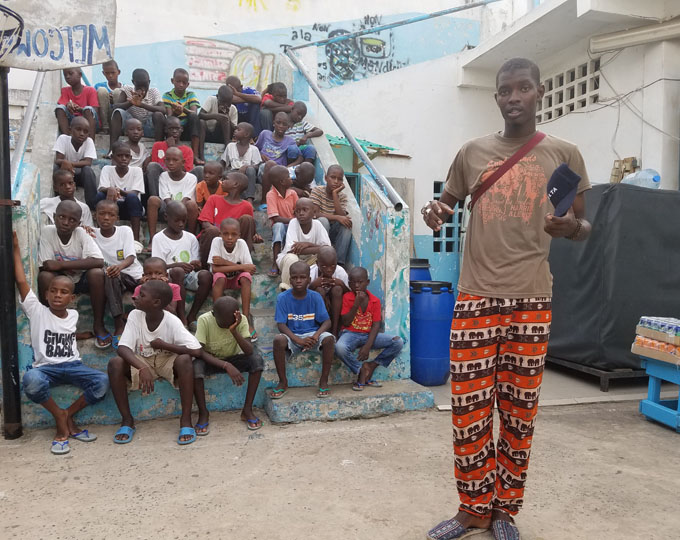
About L’Empire des Enfants
L’Empire des Enfants is a rehabilitation and transition center in Dakar, Senegal for boys ages 6-14 who have been street children. The primary goal is to reunite these children with their parents, while providing them with a safe place to live until that can happen. There are various reasons these boys end up on the streets. The most common is that a devious adult visits a village and persuades the parents to send their child to the big city of Dakar with him. Sometimes the promise is that the child will be taken to a madrasa (Quranic school) to be educated, other times the promise is that the child will be taught a trade and become wealthy in the big city. Either way, these are lies. Once the child arrives in Dakar, he is sent out on the streets to beg for money. If he fails to bring in enough on a given day, he is beaten.
L’Empire des Enfants accepts children who come to their door 24×7. If the child is a boy in the age groups that L’Empire is equipped to work with, they’ll take him in. If it’s a girl, or if it’s a boy outside their age ranges, they do what they can to find help for the child elsewhere.
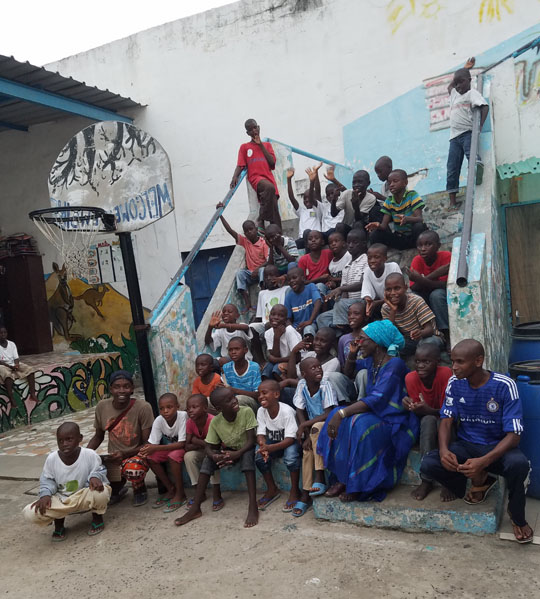
At first when children arrive at L’Empire des Enfants, they are suspicious of the adults because of the bad treatment they have already received from adults in their young lives. For that reason, the boys who already live at L’Empire take charge of teaching the newcomers how things work there and how to fit in. By mentoring newcomers, the boys learn how to take on leadership roles, and how to guide other people.
When a child arrives at L’Empire, he receives food, clothing, and shelter. There are certain rules, such as “you must attend the classes”. The boys learn these rules from their peers, and their peers are the ones who urge them to comply.
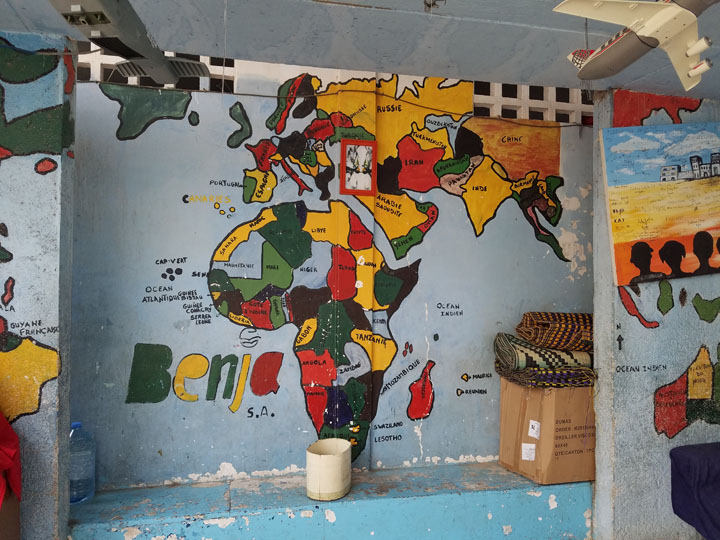
The boys are taught to read and write (if they don’t already know how). They also attend classes in life skills such as Tae Kwon Do. The aim is to teach them to take care of themselves, so that when they return to their families they can help make a living and help take care of the rest of the family.
Often, boys who come to L’Empire are unwilling at first to provide information about who their parents are, or where they come from. The adults who manage the facility realize that it can take time to build trust, and they exercise the necessary patience. Eventually, when a child is willing to open up, they’ll work with him to learn who his family is. They try to discern through the interviews whether returning to the family would be a safe thing for the boy to do. They won’t knowingly send him back to a situation where he’d be abused.
About 90% of the boys are eventually reunited with their families. Very few of those return to the streets or to L’Empire des Enfants. If they do return, L’Empire recognizes that it may have missed something important about their home situation in the interview process, and will allow them to stay.
L’Empire can accommodate up to 60 boys. The day we visited, there were about 30. It changes from day to day. They hope to build a new, larger facility in the not-so-distant future that will allow them to help more children, including girls.
About Our Visit
The primary purpose of our visit was to provide the boys with exposure to foreigners. There were 14 of us representing 7 different countries – Brazil, Mexico, India, Japan, China, the U.S., and Canada. My colleague Gopal from India brought his guitar, and my colleague Marcel from Brazil brought his soccer ball.
Tidiane timed our visit to have us arrive in the afternoon at the time the children were praying, so we could see them do that. Afterward, it was time to eat, and we were served supper after the children received theirs. We ate the same thing as the children, and it was a nutritious meal. We provided the funding for the meal – not only for what we ourselves ate, but also for the children’s food. While the children ate, the director gave us a talk about the facility and the work they do there.
After that, it was time for us to interact with the children. Our Brazilian and Mexican team members, Mauricio, Mario, and Marcel, organized a football (soccer) game.
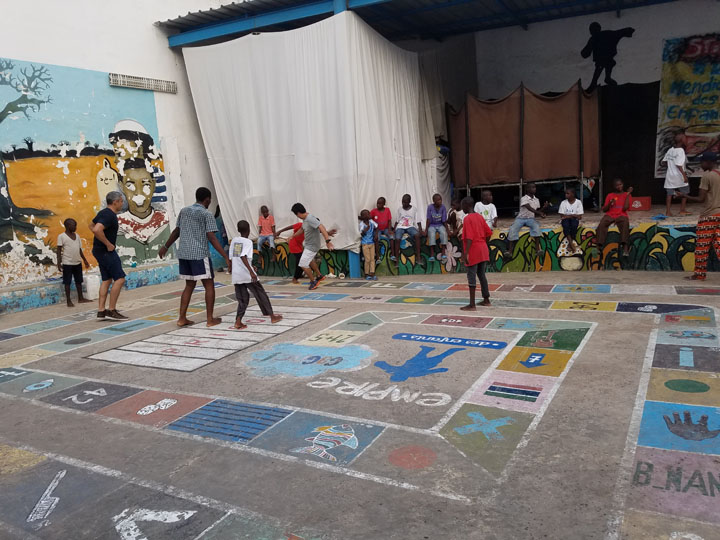
After that, Gopal played some Bollywood songs that involved yodeling – I had no idea that there was an Indian artist who yodeled! While he played, some members of our group encouraged the children to start dancing. There was much laughter and smiles all around. We had an opportunity to tour the place and see the classrooms.
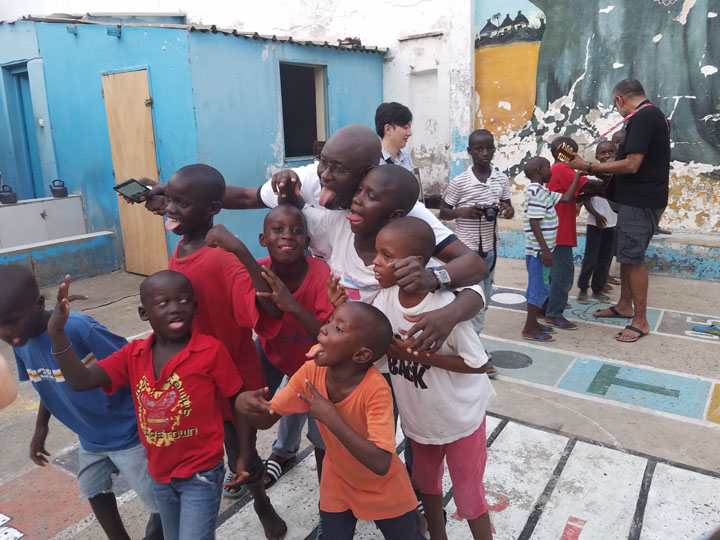
After a couple of hours, it was time for us to head out. Those who wished to donate additional funds to the operation beyond what we had given for the meal gave them to Tidiane, who consolidated all the donations and give the lump sum to L’Empire’s director.
I was glad to see the work that L’Empire was doing to offer boys hope for a better life, and I hope they’ll achieve their dream of building a new, bigger place that can help more children.
Why I Was in Senegal
In case you’re wondering why I was in Senegal for a month, I was there as part of the IBM Corporate Service Corps. You can read more about that here: https://roaming-jewel.com/2017/10/17/ibmcsc/